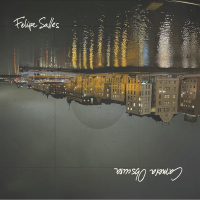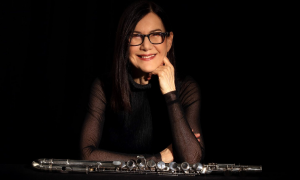Home » Jazz Articles » Interview » Dan Monaghan: The Man Behind The Swing
Dan Monaghan: The Man Behind The Swing

Monaghan has performed with some of the top names in contemporary jazz, including

Eric Alexander
saxophone, tenorb.1968

Peter Bernstein
guitarb.1967

Joe Magnarelli
trumpetb.1960

Randy Brecker
trumpetb.1945

Jimmy Bruno
guitarb.1953

Elio Villafranca
piano
Joanna Pascale
vocals
Larry McKenna
saxophone, tenor1937 - 2023
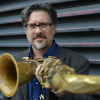
Tom Tallitsch
saxophone, tenorb.1974
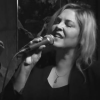
Meg Clifton
vocals
Mike Kennedy
guitarb.1968

Norman David
saxophone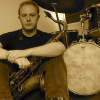
Brian Woestehoff
saxophone, tenor
John Vanore
trumpetAll About Jazz: What would be the five or six recordings you'd take to the desert island?
Dan Monaghan: Oh, man! That list would change every week for me, but right now, I'd probably take

John Coltrane
saxophone1926 - 1967

Shirley Horn
piano1934 - 2005

Miles Davis
trumpet1926 - 1991

Uri Caine
pianob.1956

James Genus
bassb.1966
AAJ: I know from your bio that your parents were classical musicians, and you studied classical percussion. So I'm surprised that you didn't mention any classical recordings.
DM: I rarely listen to classical records. But I do love to go to live classical concerts. I think the last classical record I listened to were some Ravel piano works.
AAJ: Of the many great Coltrane records, why do you especially like that specific recording at the Half Note?
DM: That one was recorded in 1965 at the zenith of the quartet with

McCoy Tyner
piano1938 - 2020

Jimmy Garrison
bass, acoustic1934 - 1976

Elvin Jones
drums1927 - 2004
Background: Long Day's Journey Into Jazz
AAJ: You have a wonderful talk on YouTube about your early development. Perhaps you can tell us here more briefly about your childhood, especially your exposure to music and how you became interested in the drums.DM: When I was two years old, my grandmother gave me a toy drum. It immediately became my favorite thing, and so I guess I always wanted to play the drums. My parents are classical musicians -they both play flute -and so there was a huge library of classical recordings in the house. There was music in the house all the time, but it was only when I started listening to pop radio programs that I heard real drum sets and got engaged in the music. My parents didn't like pop music, so I had to listen to it with headphones, and I had magical experiences listening to rock bands. My parents didn't want me to be a drummer, but I wore them down, and eventually they gave me a drum set.
My parents were classical musicians and academics, so when it came time for me to go to college, they wanted me to follow in their footsteps. I started college at Arizona State as an education major and orchestral percussion student. It so happened that there was a brilliant drummer in the Phoenix area named Dominick Moio, and I took a weekly master class on drum set with him. I started listening to jazz and played in a couple of combos. But I was really green and uninformed, trying to play mostly by ear. I went to Arizona State for two years, but didn't like it, dropped out, and drifted around for a while, eventually working in a construction company in Ithaca, NY.
Then I got serious about music and went to Mansfield University in my home town and started taking drum set lessons with

John Riley
drumsb.1954
AAJ: Did you have any interest in jazz early on?
DM: When I was a kid, my father would sometimes bring home a couple of jazz recordings from the music library. I remember a

Buddy Rich
drums1917 - 1987

Wynton Marsalis
trumpetb.1961

Weather Report
band / ensemble / orchestraWhen I listened to My Funny Valentine, I was terrified! It was too advanced for me. And in fact, it might have put me off jazz a little bit, because I thought, if this is jazz, if this is the standard by which jazz is judged, I could never be able to play this music! Obviously, I appreciate it much more now. But when I went to Arizona State, it was easier for me to catch on to things from the 1970s, like electric jazz and fusion because I was coming from a rock'n roll place. So, with jazz, I really worked myself back chronologically from fusion to hard bop, bebop, and swing. But jazz didn't hit me as a passion until I was around twenty-one and studying with John Riley.
AAJ: What drummers came to your attention at that point when you got the jazz bug?
DM: At that time, I became totally fixated on

Tony Williams
drums1945 - 1997

Wallace Roney
trumpet1960 - 2020
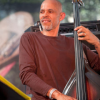
Ira Coleman
bass, acoustic
Mulgrew Miller
piano1955 - 2013

Jeff Tain Watts
drumsb.1960

Roy Haynes
drums1926 - 2024

Vernel Fournier
drums1928 - 2000

Jimmy Cobb
drums1929 - 2020
Making It as a Drummer in Philadelphia
AAJ: When did you first start playing gigs?DM: I played around with rock bands in high school, played some parties. At Arizona State, I played a few jazz gigs, and I joined a country rock band for a while. I had a jazz gig at a bar in Mansfield, but it wasn't until I got to Philly to go to Temple that I started seriously playing jazz gigs. That was in 1998. so I've been in Philadelphia for twenty years. In my last semester at Temple, I started playing out and around on a regular basis.
AAJ: So could we say that Philly was where you came of age as a jazz drummer?
DM: Absolutely! As I finished my degree at Temple around the summer of 2000, I did a session with saxophonist

Victor North
saxophone, tenorb.1967

Craig Ebner
guitarAAJ: Who have been some of the musicians and groups in Philly you've most enjoyed working with?
DM: I've had the great fortune to work often with saxophonist

Larry McKenna
saxophone, tenor1937 - 2023

Denis DiBlasio
saxophone, baritone
Brian Betz
guitarb.1977

Tony Miceli
vibraphoneb.1960

Madison Rast
bass
Chris Farr
saxophone, tenor
John Swana
electronics
Bootsie Barnes
saxophone, tenor1937 - 2020
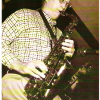 "
data-original-title="" title="">Pete Souders, trumpeter
"
data-original-title="" title="">Pete Souders, trumpeter 
John Swana
electronicsContributions of the Great Drummers
AAJ: Let's focus on your instrument, the drums. I think most readers know that drummers can make all the difference in the band, but not so much about what the drummer does other than maintain the swing. So let's talk about it. To start out, I'll mention some drummers, and you give us a snapshot of your thoughts about what each one contributed to drum approach and technique. The first one is "Papa"
Jo Jones
drums1911 - 1985
DM: I'm neither an authority on the subject nor a historian. But when I think about "Papa" Jo Jones, I think of the way he played brushes and the way he played press rolls on the snare drum
AAJ: He's been given credit for the use of the ride cymbal to maintain the beat.
DM: I think there's controversy about who used it first, whether it was Jo Jones,

Kenny Clarke
drums1914 - 1985

Max Roach
drums1925 - 2007
AAJ: The drummer

Shadow Wilson
drums1919 - 1959
DM: I'm very flattered you would say that. I wouldn't claim him as a major influence. I do remember checking him out when I was in college and just marveling at his sense of time, his left hand comping, the sound he would get from the snare drum, and the way he would punctuate phrases. It was perfect, and effortless too, especially his work with

Thelonious Monk
piano1917 - 1982
AAJ: Monk's syncopation was uniquely held away from the downbeat in a way that has been called "angular" or "perpendicular" to the beat. How did his drummers deal with that unique rhythm?
DM; Generally, Monk's drummers gave him a lot of space to do his thing. Monk's playing itself had a lot of space, which made his rhythmic placement that much more effective. So the drummers would leave a lot of room for him and not try to cram too much in. They would keep the time and provide a canvas onto which Monk could put his stuff. Monk had his own unique voice and was not apologetic about it. He once said, "Those notes are correct because I played them."
AAJ: Among the great drummers, you can't not talk about Elvin Jones.
DM: Of course Elvin had a profound impact on me and just about everyone else. I marvel at the vast range of his playing. One of my favorite records is Tommy Flanagan Overseas (Prestige, 1957) on which Elvin plays brushes on the entire record. He's one of my favorite brush players. Of course I love him with Coltrane. During his time with Coltrane, he also did records with

Wayne Shorter
saxophone1933 - 2023
AAJ: What always impresses me about Elvin's playing is its musicality. He's not just knockin' off rhythms, but almost seems to be talking and singing through the drums, conveying a message.
DM: He's got incredible independence and layer upon layer of ideas going on, and you're right: the end result is beautiful music.
Day to Day Work as a Drummer
AAJ: Let's talk about your routine on gigs. Do you have a regular drum set that you take with you?DM: I have a couple of drum sets that I usually use, but I might adjust it for a particular group. If I'm playing with a large ensemble, I might bring a bigger bass drum. Of course, some places have their own on site drum sets that I use.
AAJ: Do you favor any particular brand of cymbals or drums?
DM: I use Agop Istanbul cymbals. I've been an endorser for them for many years. I play mostly Gretsch drums, although I have an old set of Rogers drums that I like to bring out once in a while.
AAJ: For many gigs, the musicians have little or no rehearsal time. They just do a sound check, the leader calls out the tunes, and they start playing. What goes through your mind at that point?
DM: I don't have a formulaic answer to that question; it depends on the situation. Of course, I'll think of the melody. But I'll just try to stay open to whatever the moment is going to bring. I try to be as supportive as I can to the music that's happening around me. I embrace what the others are playing and try to match my playing to whatever is going on around me.
AAJ: Would you say that you're listening more than thinking?
DM: Definitely.
AAJ: I was struck by a YouTube with you and Larry McKenna in Chester Springs, PA where you guys play a swinging rendition of "Will You Still Be Mine?" We all know that Larry is a master, one of a kind. What do you do to enhance his playing?
DM: There's not much anyone can do to enhance Larry's playing! He speaks so well for himself! I just want to be swingin' and complement his phrases in any way I can. If I can catch his quotes and have a little interactive moment, that's great. I just want to give him the best backing I can, and I'm sure anyone who plays with him is going to say the same thing.
AAJ: Larry comes from a background with the

Woody Herman
band / ensemble / orchestra1913 - 1987
DM: No. I really just try to play in my own way. I don't try to categorize Larry's style. He just plays unquestionably beautiful music. So if I'm working with him, I just want to be swingin,' supportive, and not interfere with his brilliance.
AAJ: A propos of maintaining the swing, do you use a particular part of the drum set to maintain the pulse?
DM: If I'm playing with sticks, I focus my energy on the ride cymbal and use it to state the pulse, keep the time. I'll add the high hat on the two and four. I'll use the bass drum and the snare drum to interact with the soloist and punctuate the phrases.
AAJ: Do you use the bass drum at all?
DM: I do what's called "feathering" the bass drum, which is to play quarter notes very softly so that they are felt and not heard. Every time the bassist plays a note, I play the bass drum, but I want it to be under the volume of the bassist so it sort of adds an inaudible "thump" to the ensemble. If you can actually hear it, then it's too loud, and it's awful. Occasionally, though, I'll use the bass drum more firmly in response to something in the tune.
AAJ: For time-keeping, does the bassist follow you, or do you follow the bassist?
DM: I don't think of it quite like that. The bassist and I both play time, and we just work together toward the same common goal. But if I decide to interact more in conversation with the soloist, then I'll let the bassist keep time in quarter notes. And vice-versa. So there's always somebody minding the store, as it were.
AAJ: Do you use polyrhythms in your playing?
DM: It depends on your definition of that term. Can you be more specific?
AAJ: For me, polyrhythms are when you superimpose one rhythm or tempo upon another. My earliest fascination with polyrhythms goes back to the

Dave Brubeck
piano1920 - 2012

Joe Morello
drums1928 - 2011

Adam Cruz
drumsb.1970
DM: I do that. For me, it all depends on the context. If the soloist starts playing his own rhythmic pattern and the band is still keeping time, I might play a complementary rhythm to what the soloist is doing while continuing keeping time with the ride cymbal and the high hat. I might sometimes play multiple rhythms to be the liason between the soloist and the rest of the rhythm section, straddling both sides of the fence. But for me, it all depends on the moment and whether the situation calls for it. I see myself as supporting the group, so I'll only use polyrhythms under certain circumstances.
Beyond the Drums
AAJ: Drummers are of course skilled at rhythmic possibilities, but I was told by a very reliable source, a fellow musician of yours, that you also have a really good ear for melody and harmony, which isn't true of all drummers. I understand that you teach music theory, which drummers don't ordinarily do.DM: I've been teaching in the theory department at Temple for many years now. I was fortunate to study with great theory teachers like Dr. Michael Galloway at Mansfield University, as well as

Ben Schachter
saxophone, tenorb.1962
Greg Kettinger
guitarMike Frank
keyboardsAAJ: Do you ever compose?
DM: I've written a couple of things. I do more arranging than composing. For example, I did some of the arranging for The New Gypsies recording I recently made with vibraphonist Tony Miceli. We took the music of

Django Reinhardt
guitar1910 - 1953
Spirituality, Advice to Young Musicians, Upcoming Projects
AAJ: I'm really struck by your frequent emphasis on serving the other musicians rather than coming from your own ego needs. Selflessness is a part of our spiritual nature. Since there are many connections between jazz, meditation, and spirituality, I often ask musicians about their own spiritual ideas and practice. How does that all add up for you?DM: I meditate on occasion, and I read the Tao Te Ching here and there, usually when I'm on the subway. I try to remember that I don't know everybody's back story, and their travels in life may be way more painful than mine, so even if there's a conflict or a hassle I try to be understanding and compassionate. I am grateful that the field of music is infinite, so I'm never at a loss for productive use of my time and energy. I'm never bored. I always try to stay positive and engaged with the world.
AAJ: It sounds like you've learned a lot from Buddhism. But I don't have the impression that you have a formal set of beliefs and practices.
DM: You're right. I don't have a specific practice or adhere to a particular religious orientation.
AAJ: You've logged many hours in your career, and are very accomplished and happy in your work. What advice might you give to a young musician just out of school who is embarking upon a career in jazz?
DM: One thing I definitely suggest that they're not doing enough these days is to go out and hear live music. While there are great records to draw from, I get a lot more out of hearing the music live. And you can see and hear the way the musicians communicate on stage, so you can learn things you can't get from a recording. I also recommend talking with the great players. Like when I first got to Philadelphia, I talked with drummer

Byron Landham
drumsb.1969

Mickey Roker
drums1932 - 2017
AAJ: What are some of your current and upcoming projects?
DM: I'm very excited about The New Gypsies recording which I mentioned before. I joined with Miceli as well as Chico Huff on bass, and

Vic Juris
guitar1953 - 2019
AAJ: That's a great concept. How did you come up with that idea?
DM: Tony, Chico, and I have known each other for a long time, and we recently started working as a trio. We loved the chemistry between us, and we wanted to make a recording together. Around that time Tony was asked to do a performance of re-imagined old French jazz tunes. So we made some arrangements for the gig and invited Vic Juris to join us. Vic is into gypsy music, and a stream of beautiful music always flows from him all the time. We loved what we did together, and we decided to make a recording of it.
On another note, vocalist Joanna Pascal and I are going to hook up with the Larry McKenna Jazz Orchestra for some live performances and hopefully a recording. I've done four records with

Jon Lundbom
guitar
Jon Irabagon
saxophone, tenor
Bryan Murray
saxophone, tenor
Moppa Elliott
bassb.1978
Photo Credit: Victor L. Schermer
Tags
Interviews
Dan Monaghan
Victor L. Schermer
United States
Pennsylvania
Philadelphia
Eric Alexander
Peter Bernstein
Joe Magnarelli
randy brecker
Jimmy Bruno
Elio Villafranca
Joanna Pascal
Larry McKenna
Tom Tallitsch
Meg Clifton
Mike Kennedy
Norman David
Brian Woestehoff
John Vanore
John Coltrane
Shirley Horn
Miles Davis
Uri Caine
James Genus
Ralph Peterson, Jr.
McCoy Tyner
Jimmy Garrison
Elvin Jones
Dominick Moio
John Riley
Buddy Rich
wynton marsalis
Weather Report
Tony Williams
Wallace Roney
Bill Peirce
Ira Coleman
Mulgrew Miller
Jeff "Tain" Watts
Roy Haynes
Vernel Fournier
Jimmy Cobb
Victor North
Kyle Kohler
Craig Ebner
Larry McKenna
Denis DiBlasio
Brian Betz
tony miceli
Madison Rast
Chris Farr
John Swana
Bootsie Barnes
Pete Souders
Sid Simmons
Bim Strasberg
"Papa" Jo Jones
Kenny Clarke
Max Roach
Shadow Wilson
Thelonious Monk
Wayne Shorter
Woody Herman
Dave Brubeck
Joe Morello
Adam Cruz
Ben Schachter
Greg Kettinger
Mike Frank
Django Reinhardt
Byron Landham
Mickey Roker
Vic Juris
Jon Lundbom
Jon Irabagon
Bryan Murray
Moppa Elliott
Comments
PREVIOUS / NEXT
Dan Monaghan Concerts
Oct
14
Tue

Harrisburg Jazz Collective
West Shore TheatreNew Cumberland , PA
Nov
11
Tue

Harrisburg Jazz Collective
West Shore TheatreNew Cumberland , PA
Dec
9
Tue

Harrisburg Jazz Collective
West Shore TheatreNew Cumberland , PA
Support All About Jazz
 All About Jazz has been a pillar of jazz since 1995, championing it as an art form and, more importantly, supporting the musicians who make it. Our enduring commitment has made "AAJ" one of the most culturally important websites of its kind, read by hundreds of thousands of fans, musicians and industry figures every month.
All About Jazz has been a pillar of jazz since 1995, championing it as an art form and, more importantly, supporting the musicians who make it. Our enduring commitment has made "AAJ" one of the most culturally important websites of its kind, read by hundreds of thousands of fans, musicians and industry figures every month.
Go Ad Free!
To maintain our platform while developing new means to foster jazz discovery and connectivity, we need your help. You can become a sustaining member for as little as $20 and in return, we'll immediately hide those pesky ads plus provide access to future articles for a full year. This winning combination vastly improves your AAJ experience and allow us to vigorously build on the pioneering work we first started in 1995. So enjoy an ad-free AAJ experience and help us remain a positive beacon for jazz by making a donation today.

Philadelphia
Concert Guide | Venue Guide | Local Businesses
| More...




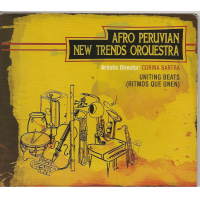

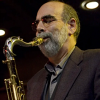



 Buy Now
Buy Now



